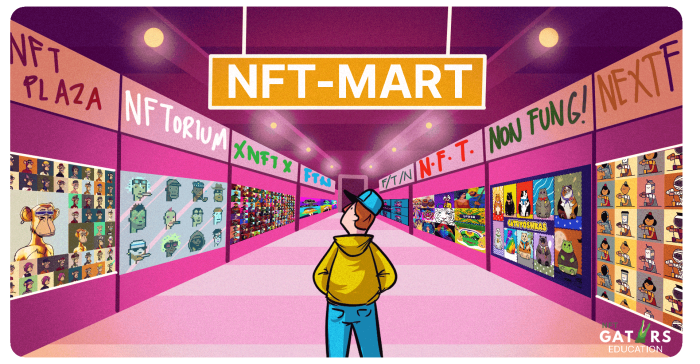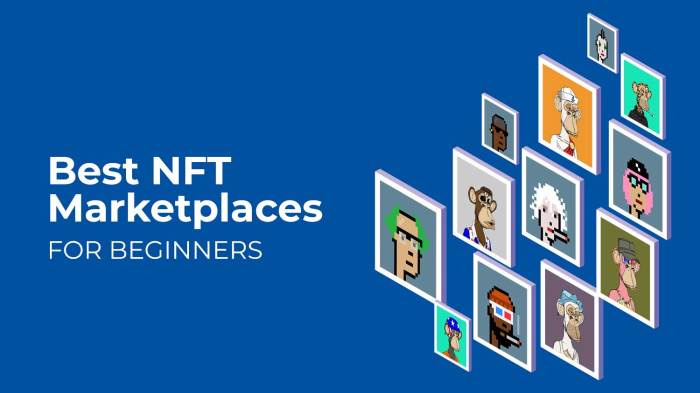NFT marketplaces have sparked a revolution in the world of digital art trading, transforming the way artists and collectors interact in an ever-evolving landscape of creativity and innovation. From the concept of NFT marketplaces to the latest trends shaping the industry, dive into this captivating exploration of the digital art market.
What are NFT Marketplaces?

NFT marketplaces are online platforms where users can buy, sell, and trade non-fungible tokens (NFTs). These digital assets represent ownership of unique items such as digital art, collectibles, music, videos, and more. Each NFT is stored on a blockchain, ensuring its authenticity and scarcity.
Popular NFT Marketplaces
- OpenSea: One of the largest NFT marketplaces, offering a wide range of digital collectibles and art.
- Rarible: Known for its user-friendly interface and support for creators to mint their own NFTs.
- SuperRare: Focuses on high-quality digital art pieces from talented artists around the world.
- Foundation: An invite-only platform that showcases exclusive NFT artworks from top creators.
Role of NFT Marketplaces in the Digital Art World
NFT marketplaces have revolutionized the art industry by providing a new way for artists to monetize their work and connect directly with collectors. These platforms eliminate the need for intermediaries, allowing artists to receive fair compensation for their creations. Additionally, NFTs offer provenance and scarcity, enhancing the value of digital art in the eyes of collectors.
How do NFT Marketplaces Work?
When it comes to NFT marketplaces, the process of buying and selling non-fungible tokens is quite unique compared to traditional marketplaces.
Blockchain Technology
One of the key components behind NFT marketplaces is blockchain technology. Each NFT is stored on a blockchain, which acts as a digital ledger that records transactions securely and transparently.
Blockchain technology ensures the authenticity and ownership of NFTs by providing a decentralized and immutable record of ownership.
Transaction Fees and Policies
Various NFT marketplaces have different transaction fees and policies that users should be aware of before buying or selling NFTs.
- OpenSea: OpenSea charges a 2.5% fee on the seller for each transaction, along with gas fees required for Ethereum transactions.
- Rarible: Rarible charges a 2.5% fee on the seller for each transaction, with additional gas fees for Ethereum transactions.
- Foundation: Foundation charges a 15% fee on the seller for each transaction, which is higher compared to other platforms.
Trends in NFT Marketplaces
From the rise of celebrity endorsements to the integration of NFTs in gaming and virtual worlds, the NFT marketplace industry is experiencing significant trends that are shaping its future.
Impact of Celebrity Endorsements
Celebrity endorsements have become a powerful driving force in the NFT marketplace industry. When a well-known figure attaches their name to an NFT project, it instantly gains credibility and attracts a larger audience. This increased visibility not only boosts sales but also helps establish NFTs as a legitimate form of investment and collectibles.
Integration of NFTs in Gaming and Virtual Worlds
The integration of NFTs in gaming and virtual worlds is revolutionizing the way we interact with digital assets. By tokenizing in-game items, players can truly own and trade their virtual possessions, creating a new economy within the gaming industry. This trend has the potential to redefine the concept of ownership in virtual spaces and open up exciting new possibilities for creators and players alike.
Legal and Ethical Considerations

When it comes to NFT marketplaces, there are several legal and ethical considerations that need to be taken into account to ensure fair practices and protection for all parties involved.
Legal Implications of NFT Ownership and Copyright Issues, NFT marketplaces
- Ownership Rights: NFT ownership raises questions about the actual ownership of digital assets and the rights that come with it. Clear guidelines and legal frameworks are needed to establish ownership and prevent disputes.
- Copyright Infringement: NFTs can be created using copyrighted materials without the creator’s permission, leading to legal issues. Marketplaces need to implement strict policies to prevent copyright infringement and protect intellectual property rights.
- Smart Contracts: Smart contracts used in NFT transactions need to comply with existing laws and regulations to ensure transparency, security, and enforceability.
Environmental Concerns and Energy Consumption
- Energy Consumption: The process of minting and trading NFTs consumes a significant amount of energy, leading to environmental concerns. Marketplaces should explore eco-friendly solutions and offsetting practices to reduce their carbon footprint.
- Blockchain Technology: The underlying blockchain technology powering NFT transactions, such as Ethereum, contributes to high energy consumption. Developing more sustainable blockchain solutions is crucial to mitigate environmental impact.
Ethical Dilemmas in Sale of Digital Art as NFTs
- Artist Compensation: NFT sales raise questions about fair compensation for artists and the impact on traditional art markets. Ensuring that artists receive their fair share of proceeds and royalties is essential for ethical practices.
- Cultural Appropriation: The sale of digital art as NFTs can lead to issues of cultural appropriation and exploitation. Marketplaces need to implement guidelines to prevent the unauthorized use of cultural symbols and artworks.
- Transparency and Authenticity: Maintaining transparency in NFT transactions and verifying the authenticity of digital artworks are crucial to prevent fraud and ensure ethical practices within the marketplace.